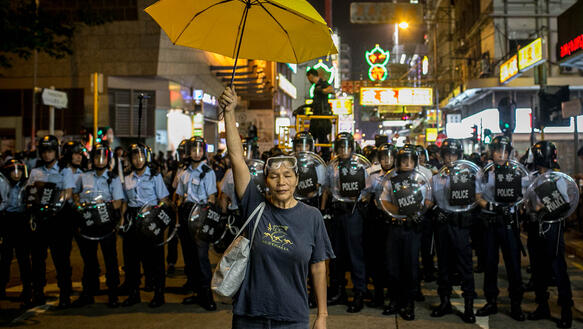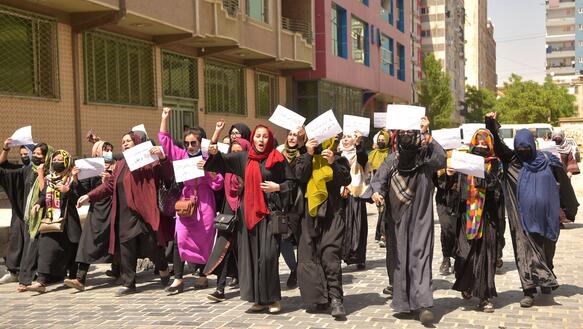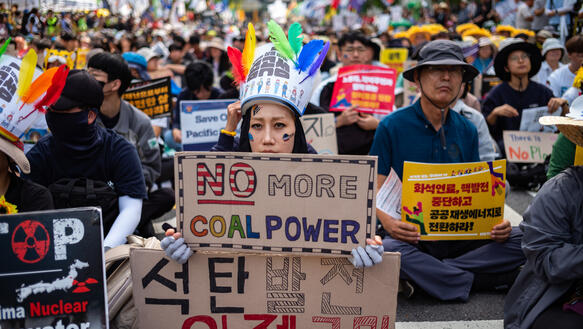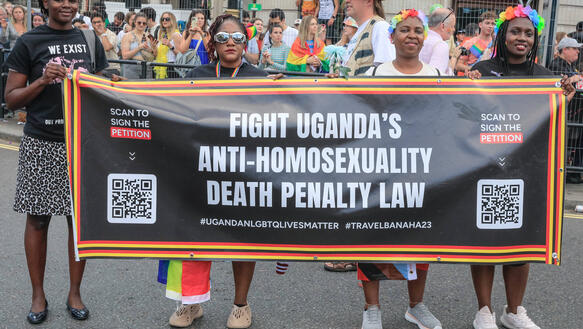DEINE SPENDE KANN LEBEN RETTEN!
Mit Amnesty kannst du dort helfen, wo es am dringendsten nötig ist.
DEINE SPENDE WIRKT!
EU: Zunehmender Einsatz digitaler Technologien zur Migrationskontrolle menschenrechtlich bedenklich
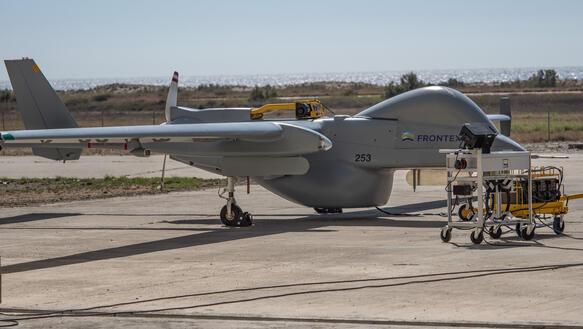
Eine Überwachungsdrohne, die im Auftrag von Frontex über dem Mittelmeer eingesetzt wird (undatiertes Bild).
© Airbus
Amnesty International veröffentlicht ein neues Briefing über den zunehmenden Einsatz digitaler Technologien im Bereich Asyl und Migration und sich daraus ergebende menschenrechtliche Fragestellungen. Das Briefing "Defending the Rights of Refugees and Migrants in the Digital Age" betrachtet die Einführung digitaler Technologien in der Europäischen Union sowie in Großbritannien und in den Vereinigten Staaten von Amerika – darunter fallen Technologien für die Grenzexternalisierung sowie 'Lügendetektoren', die künstliche Intelligenz (KI) einsetzen.
Die Europäische Union setzt Echtzeit-Luftüberwachung und Drohnen über dem zentralen Mittelmeer ein, um Boote mit Schutzsuchenden auf See zu identifizieren und mit den libyschen Behörden die völkerrechtswidrige Rückführung zu koordinieren, sodass die Menschen die europäischen Küsten gar nicht erst erreichen. Der Bericht zeigt auch, wie europäische Staaten, darunter Deutschland, zunehmend Mobiltelefone von Asylsuchenden durchsuchen und dabei unverhältnismäßig deren Privatsphäre verletzen.
Lena Rohrbach, Expertin für Menschenrechte im digitalen Zeitalter bei Amnesty International in Deutschland, sagt: "Die Bundesregierung muss sich dafür einsetzen, dass neue Technologien nicht zu weiteren Menschenrechtsverletzungen für Schutzsuchende führen. KI-basierte angebliche "Emotionserkennung" führt zu Diskriminierung und Fehlern und muss verboten werden – in Deutschland und in der EU. Massenüberwachung verletzt die Privatsphäre, sei es pauschales Durchsuchen von Handys oder die massenhafte Überwachung der Bewegungen von Menschen. Vor dem Einsatz neuer Technik muss deshalb immer eine menschenrechtliche Folgeabschätzung stehen."
Die vollständige englische Presseerklärung ist hier zu finden:
Global: Amnesty International publishes an introduction to defending the rights of refugees and migrants in the digital age
Amnesty International has today published an introductory briefing on the pervasive and rapid deployment of digital technologies in asylum and migration management systems across the globe including the United States, United Kingdom and the European Union.
Defending the Rights of refugees and Migrants in the Digital Age, highlights some of the key digital technology developments in asylum and migration management systems, in particular systems that process large quantities of data, and the human rights issues arising from their use.
"This is a snapshot of some of the key digital technology developments in asylum and migration management systems focusing on the increasing digital alternatives to detention, border externalisation technologies, data software, biometrics and algorithmic decision-making systems," said Matt Mahmoudi, Amnesty International Adviser on Artificial Intelligence and Human Rights Technology.
"The proliferation of these technologies risk perpetuating and reinforcing discrimination, racism, disproportionate and unlawful surveillance against racialised people."
These technologies are increasingly becoming a key human rights concern as states deploy them in ways that violate their human rights obligations towards refugees and migrants.
Nature of digital technology deployment
The briefing documents how governments across the world have deployed specific technologies in asylum and migration systems.
Border authorities in the United States have used the Intensive Supervision Appearance Program (ISAP) and the Electronic Monitoring Device Program, to monitor migrants and asylum seekers released from detention arguing that the intention was to provide release options for migrants and asylum seekers.
However, these products have been linked to violations of human rights.
The briefing also highlights the US government’s deployment of "smart" surveillance infrastructure such as Al-driven watchtowers along the US-Mexico border increasing the risk of profiling black, Latin American and other racialised communities.
In the UK mandatory electronic ankle "tagging" has been used to monitor all foreigners facing deportation, while facial recognition-enabled smart watch tracking has been proposed.
The European Union (EU) has deployed aerial real-time surveillance and drones over the central Mediterranean Sea to identify refugee and migrant boats at sea and coordinate with Libyan authorities to block them from reaching European shores.
An EU-funded automated border control system called iBorderCtrl was piloted in Hungary, Greece and Latvia. The project used an artificial intelligence (AI) 'lie-detecting' system to interview travellers seeking to cross borders, while assessing the minute details of their facial expressions using facial and emotion recognition technologies. Travellers deemed to answer questions honestly by the system are provided with a code allowing them to cross the border.
The briefing also shows how Austria, Belgium, Denmark, Germany, Norway and the UK are increasingly introducing laws that allow for the confiscation of phones belonging to asylum seekers for the purposes of corroborating their testimonies when processing their asylum cases.
Discriminatory impact on refugees, migrants and asylum seekers
These technologies are reinforcing exclusion and blocking the movement of black, Muslim, and other racialised migrants, asylum seekers and refugees.
They are building border regimes that discriminate based on race, ethnicity, national origin, and citizenship status.
For example, the European Union (EU) has expanded its borders virtually into the Mediterranean and across transit regions in Africa through a range of technologies, allowing them to monitor their movement at every step.
"Digital technologies are reinforcing border regimes that disproportionately impact racialised people. Inherent racism is deeply ingrained within migration management and asylum systems," said Charlotte Phillips, Amnesty International Advisor on Refugee and Migrants’ Rights.
"These technologies have inherent biases and errors that threaten the right to non-discrimination as well as other human rights."
States’ responsibility to protect rights of migrants and asylum seekers
The briefing recommends that states must:
- Protect the rights of people on the move by refraining from using technologies that are at odds with human rights and ensuring digital technologies address systemic racism, xenophobia, and discrimination.
- Prohibit the use of AI-based emotion recognition tools, especially in the context of migration, asylum, and border control management.
- Conduct human rights impact assessments and data protection impact assessments before deployment of digital technologies.
- Prohibit automated risk assessment and profiling systems in migration, asylum management, and border control.
- Prohibit any use of predictive technologies that wrongfully threaten the right to asylum.
Background
Amnesty International is publishing this introduction to defending the rights of refugee and migrants in the digital age to aid civil society organizations, activists, journalists, and supporters of the movement who want to learn about the digital characteristics of asylum and migration management practices and their human rights consequences.
